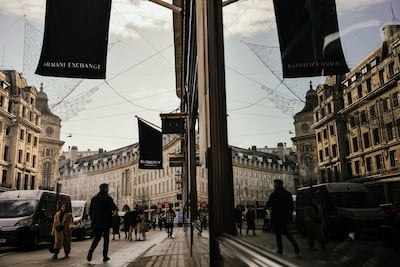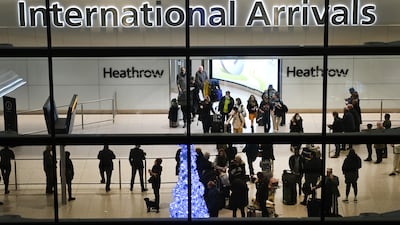From many viewpoints, the UK economy is not having a good time of it at the moment.
This week, economists at the well-regarded EY Item Club revamped their figures and concluded that the expected recession in the UK could be twice as bad as previously thought.
Meanwhile, the S&P Global Purchasing Managers' Index showed a contraction of business activity, while the Confederation of British Industry said the number of factories in the UK operating below full capacity was at its highest in nearly two years.
But, as is usually the case with macro economics, there are some bright spots on the dark canvas. Visitors from the Gulf ― seeking new properties or luxury shopping ― may be able to make the most of Britain's current troubles.
Tourists have been steadily flocking back to Britain in the wake of the coronavirus pandemic, not least because the UK's domestic economic woes are holding the reins on the pound, which although recovered from the battering it received from the short-lived Truss government last year, is still well below the peaks it reached in 2021 and 2018.
The chief executive of VisitBritain, Patricia Yates, told The National that flights from the Middle East are back to 96 per cent of what they were in 2019 and many more visitors are expected this year, not least because the UK is dropping visa requirements for citizens of most GCC countries and replacing them with a simpler Electronic Travel Authorisation system.
“The introduction of the Electronic Travel Authorisation scheme for GCC visitors in 2023, alongside our strong airline and route connectivity, will make it even easier to visit the UK, boosting our competitive tourism offer to the region and our welcome,” she added.
Overall, VisitBritain is predicting a mixed picture this year. Passenger arrival numbers are expected to be higher, but exactly how much each will spend is less clear.
The effect of the global economic slowdown (and possible recession) may reduce the total number of people travelling around the world.
Yet while the relative weakness of the British pound may attract more tourists to the UK, high inflation will erode the value of tourism spending.
Nonetheless, figures from VisitBritain and the Office for National Statistics show that, on average, visitors from GCC countries stay longer and spend more.
In 2019, GCC citizens spent £2,151 per visit for the UK, three times the average of all tourists.
“The GCC is a very important inbound tourism market, our second most valuable, worth £2.6 billion in 2019, when all GCC countries are combined,” Ms Yates said.
“As well as spending more than the average visitor, and being high repeat visitors, visitors from the GCC also stay longer, 12 nights compared with the all-market average of seven, supporting tourism and hospitality businesses right across Britain.
“While in the UK, GCC visitors are more likely to dine in restaurants and go shopping than other visitors, also supporting our hotels and restaurants.”

Shop until you drop
The ETA system that will essentially replace the sometimes cumbersome visa process for GCC citizens is being welcomed by the UK's retailers, who are very keen on the increase in tourists that happened in recent months.
The New West End Company, which represents 600 retail, restaurant, hotel and property owners in London's upmarket West End shopping district, has been campaigning for the ETA because it “marks an opportunity for growth in the West End, paving the way for increased numbers of GCC visitors”.
Shopping has always been one of the main motivators for GCC citizens visiting the UK. Indeed, according to 2019 data from the tax-free shopping company Global Blue, 41 per cent of visitors from the UAE cite shopping as their primary reason for visiting London.
But for British retailers, eager to sell to international tourists, there's a problem.
In 2021, when Prime Minister Rishi Sunak was chancellor, he ended the long-standing duty-free shopping scheme, where foreign visitors could have the value added tax (VAT) on their purchases refunded before they left the UK.
That was going to be reversed by the chancellor under the short-lived Truss government, Kwasi Kwarteng. It's estimated the move would have cost the UK Treasury about £1.3 billion in the financial year 2024-2025.
But any hope among retailers that tax-free shopping would make a comeback was trounced by Mr Kwarteng's replacement Jeremy Hunt, who has made it clear the scheme will not return.
“Like much of the retail, leisure and hospitality industry, we have been appealing to the UK government to reintroduce tax-free shopping to encourage the return of high-spending international tourists to British shores,” Dee Corsi, chief executive of the New West End Company, told The National.
“While we have enjoyed a strong period of recovery since the pandemic, our ability to grow has been hindered by the government ending tax-free shopping in the UK ― we are now the only major European country not to offer this to international visitors.”
Which means there's a real danger that high-spending tourists from GCC countries will seek to make their retail purchases in the EU, rather than in the UK.
“Early evidence shows that GCC visitors to Europe are diverting their spending away from London to Paris and Milan,” Ms Corsi said.
“In fact, one recent survey from the Association of International Retail showed that while spending in the UK by GCC visitors was at 90 per cent of pre-Covid levels, in the EU it was at over 150 per cent of 2019 levels. We view this as an economic own goal by the government.”
Window of opportunity
However, visitors from the GCC countries are not just frequenting London's high-end department stores, searching for luxury items to take home with them.
Many are looking for a more permanent purchase, made of bricks and mortar.
Alex James is a specialist in commercial property from the estate agents Knight Frank. For him, demand from his Middle Eastern clients is focused on three main areas: residential senior homes, student accommodation and properties involved in the logistics sector, for example warehousing.
“They can see from the economics of the UK that there’s an ageing population, so there needs to be that supplied, And as the UK is one of the best places to get educated, we’re seeing international demand for that come back again,” he told The National.
“And then logistics is the other one ― and that’s really online deliveries, third-party logistics and so on. The vacancy rates in logistics are really, really low, so there’s rental growth that’s going to come through in that sector.”
Because of supply chain problems, more goods are being stored in the UK, Mr James said. All those goods need properties to be stored in.
“If you're trying to get materials from China that may take three, four or six months to get here, so, actually, we’ve seen a lot more reshoring of goods and therefore we’re seeing the demand for storage come through.”
But for Mr James there's a window of opportunity for those looking to get into this market. Given that interest rates and inflation are expected to fall over the course of this year and into 2024, the deal that the cash-rich investor from a GCC country might find attractive now will have a shelf life.
“Just this week, I’ve had four investors fly to the UK to meet me and speak about products. And that’s a lot ― these are big institutional investors and they’re saying 'we’re here to do business over the next few months'. So, these are interesting times,” he told The National.
Residential supply and demand
Likewise, there are interesting times in London's high-value residential property sector. The rise in the cost of UK borrowing has favoured the fortunes of the cash-rich buyer when on the hunt for properties in excess of £10 million in some of London's most exclusive neighbourhoods.
According to research by the estate agents Knight Frank, buyers from the Middle East acquiring property in central London hit a four-year high in the second half of 2022.
Knight Frank’s figures show that buyers from the Middle East were involved in more than one in 10 of the property transactions in London's most prestigious postcodes.
“Compared with some parts of the world, buyers from the Middle East have been relatively free to travel to London and take advantage of the weak pound, which has resulted in discounts of more than 40 per cent compared with 2014 when price and currency movements are combined,” said Tom Bill, head of UK residential research at Knight Frank.

So, the dollar-rich cash buyer is in an enviable position. At the top end of the property value chain many houses are sold off the market ― enquires are made and willing sellers are matched with enthusiastic buyers without the property ever going on the open market.
Mark Pattanshetti, associate director at largemortgages.com and millionplus.com, is seeing an increasing number of enquiries at the premium end of the London property market from clients in GCC countries.
“London predominately, particularly Central London, has always been a really attractive prospect for GCC buyers, particularly from Saudi Arabia and Dubai. And those properties, in particular, is where we’re seeing a lack of supply and where we’re seeing the most demand and the most enquiries,” he told The National.
“There is an opportunity right now for cash-rich buyers to come in. They can see the market is very quiet ― it hasn’t been this quiet, apart from during the Covid-19 lockdowns, since Brexit was announced. It absolutely took off after January 2021 until the middle of last year.”
The increase in arrivals of visitors from the GCC countries to the UK, be it for business or pleasure, is a welcome boost for the weathered British economy.
Visitors from GCC nations represent high value to the UK tourism economy. For example, in 2019 while GCC visitors made up just 5 per cent of all non-EU visitors to the UK, they accounted for nearly a third of the £3 billion tax-free shopping spend in that year, according to data from Global Blue.
Meanwhile, the UK, and especially London, remains a priority for those GCC citizens looking to make significant plays in the UK property market.
Henry Faun, head of Knight Frank's Private Office in the Middle East, said: “Investors remain bullish on London’s outlook; the Emirati clients I am speaking with feel it currently offers an opportunity not matched elsewhere globally and will bounce back strongly as it always has.”


